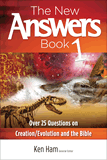
Does It Really Matter If Moses Wrote Genesis?
Get Answers
Who wrote Genesis? It may sound like an innocent question, but it’s not. This question reflects a common motivation, a desire to defend humanistic views that are based on evolution, even if it means denying that Genesis is real history written by Moses.
This question reflects a desire to accommodate humanistic views that are based on evolution.
Are you prepared to expose the disastrous problems with this claim?
The new book The Evolution of Adam is just the latest example of this old error, which keeps cropping up. Besides arguing against the literal historical creation of Adam as described in Genesis, the author, Dr. Peter Enns, denies that Moses wrote the first five books of the Bible (the Pentateuch).
In making this claim, the author realizes that he must somehow explain Christ’s statement: “For if you believed Moses, you would believe Me; for he wrote about Me” (John 5:46). In attempting to defend his views despite this verse, he writes, “Jesus here reflects the tradition that he himself inherited as a first-century Jew and that his hearers assumed to be the case.”1 In other words, Jesus accommodated his teaching to suit the erroneous thinking of His day.
A popular view among liberal theologians since the eighteenth century is that Jesus accommodated the beliefs of His time and incorporated them into His teaching. The accommodation theory posits that He knew the belief was wrong, but didn’t bother to deal with it because it would have been a distraction in His quest to save us from our sins. A related view, the limitation theory, states that Jesus was limited in His understanding to the degree that He unwittingly taught error.2
The consequences of these ideas are catastrophic. If Jesus knowingly taught error, then He lied. If He unwittingly taught error, then He was a false teacher. Either way, this position makes Jesus a sinner and less than God. If He sinned, then Jesus could not die on the Cross for our sins, because He would have needed to die for His own sins. Furthermore, charging Jesus with error means that the Father was also in error, since Jesus said that He spoke only the things the Father taught Him (John 8:28).
So who is correct: Jesus or the theologians who reject that Moses authored the Pentateuch? Obviously, God was there when Moses wrote these books, and He is the One who inspired Moses to write them (2 Timothy 3:16). This is yet another example of the tragic results of compromising God’s Word with the fallible and ever-changing ideas of man.
Answers Magazine
April – June 2012
Now’s your chance to answer every question you ever had about cavemen! This issue is chock full of the latest information about Neanderthals, Homo erectus, “the Hobbit,” and other media stars. Were they like us? How did they die? Also learn about the wonders of the sun, creatures that glow in the dark, and the reason all Hebrew scholars agree that Genesis 1 says creation was six literal 24-hour days!
Browse IssueFootnotes
- Peter Enns, The Evolution of Adam: What the Bible Does and Doesn’t Say about Human Origins (Grand Rapids, MI: Brazos Press, 2012), p. 153.
- For more on the accommodation and limitation theories, see www.answersingenesis.org/articles/2012/01/30/peter-enns-jesus-was-wrong
Recommended Resources

Answers in Genesis is an apologetics ministry, dedicated to helping Christians defend their faith and proclaim the good news of Jesus Christ.
- Customer Service 800.778.3390
- Available Monday–Friday | 9 AM–5 PM ET
- © 2026 Answers in Genesis





